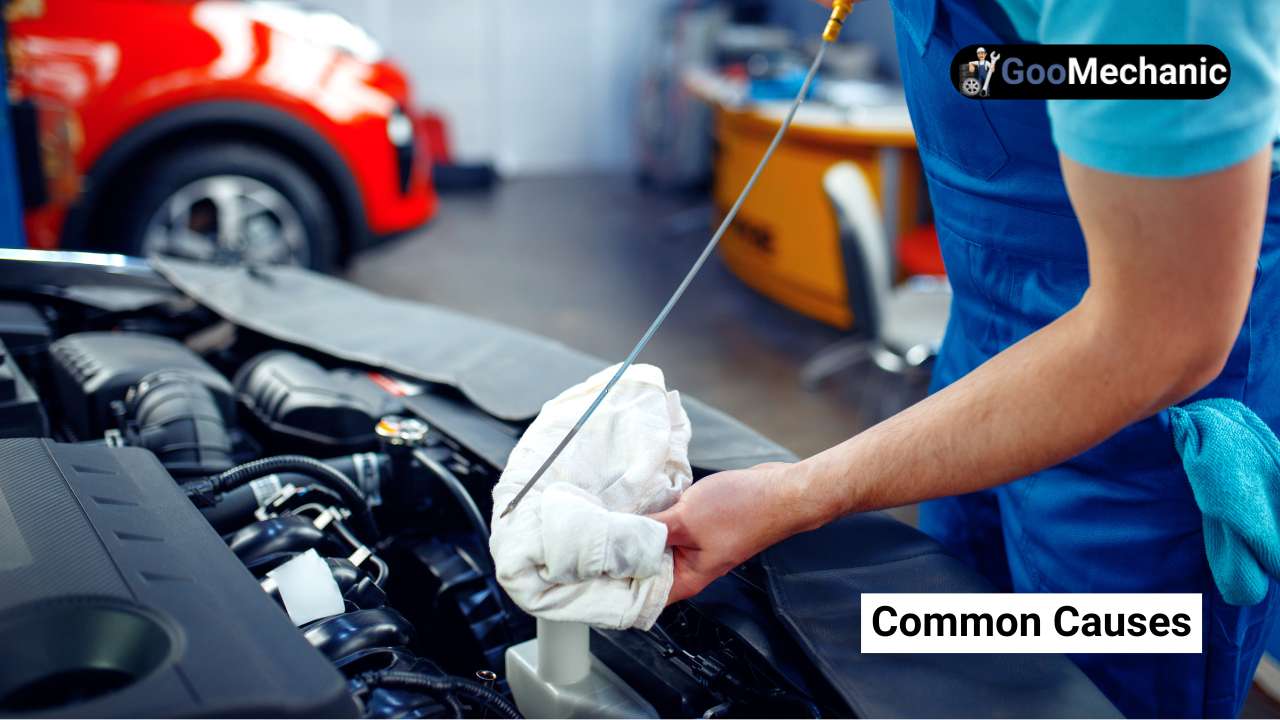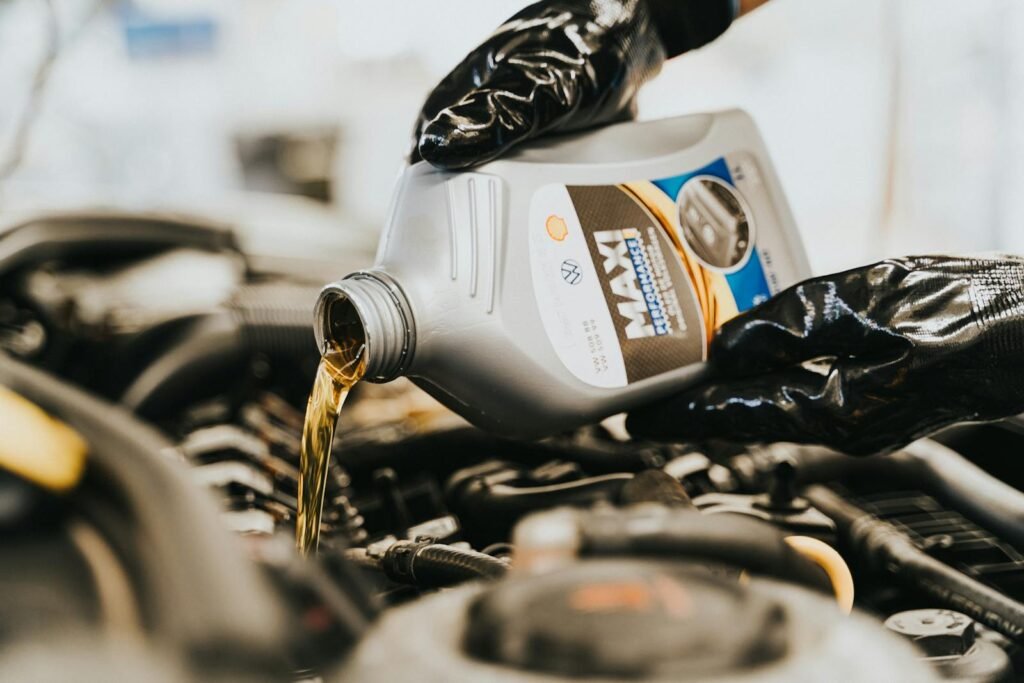Your oil might smell like gas because of a fuel leak or incomplete combustion in the engine. These issues can dilute the oil with gasoline.
Experiencing an oil smell like gas in your car can be alarming. It often indicates underlying mechanical problems. Common causes include fuel system leaks, faulty fuel injectors, or issues with the carburetor. These problems allow gasoline to mix with the engine oil.
This dilutes the oil and reduces its effectiveness, potentially harming your engine. Regular maintenance checks can help identify these issues early. Addressing them promptly can prevent more severe damage and costly repairs. Always consult a professional mechanic if you notice any unusual smells or performance issues in your vehicle. Proper care ensures your car runs smoothly and safely.
Common Causes

One of the alarming signs for car owners is smelling gas in the oil. This issue can point to several underlying problems that need immediate attention. Understanding the common causes helps in diagnosing the problem correctly and taking the necessary steps to fix it.
Fuel Injector Issues
Fuel injectors play a crucial role in delivering fuel to the engine. Faulty fuel injectors can cause gas to mix with the oil. This happens when the injector leaks, allowing unburned fuel to seep into the oil pan. Here are some symptoms of fuel injector problems:
- Poor engine performance
- Reduced fuel efficiency
- Engine misfires
If you notice these symptoms, consider checking the fuel injectors for leaks.
Carburetor Problems
Older vehicles with carburetors may face this issue as well. Carburetor malfunctions can lead to an improper fuel-air mixture. This causes excess fuel to enter the engine. Here are some signs of carburetor issues:
- Black exhaust smoke
- Engine backfires
- Hard starting
Regular maintenance of the carburetor can prevent these problems. Ensure the carburetor is tuned correctly and check for any blockages.
Signs Of Contamination

Noticing a gas smell in your car’s oil is a cause for concern. This contamination can lead to serious engine issues. Understanding the signs can help prevent further damage.
Odor Detection
The most obvious sign is the odor. If you smell gasoline when checking your oil, this is a red flag. The oil should have a neutral or slightly oily smell. A strong gas odor indicates contamination.
To check, remove the dipstick and take a sniff. If it smells like gas, contamination is likely. Make sure to do this in a well-ventilated area.
Performance Issues
Contaminated oil can cause performance issues. Your car may misfire or stall. You might notice a decrease in fuel efficiency. These signs point to contaminated oil.
Check the exhaust smoke. If it’s darker than usual, this could indicate a problem. Watch for any unusual engine noises. Knocking or pinging sounds are also signs of trouble.
Here’s a quick reference table for these signs:
| Sign | Indication |
|---|---|
| Gas Odor in Oil | Oil contamination by gasoline |
| Engine Misfires | Potential contamination and performance issues |
| Decreased Fuel Efficiency | Possible oil dilution |
| Darker Exhaust Smoke | Oil and fuel mixture issues |
| Unusual Engine Noises | Potential internal damage |
Keep an eye on your dashboard indicators. The check engine light may come on. This could be related to contaminated oil. Address these signs promptly to avoid costly repairs.
Potential Risks
Smelling gas in your car’s oil can be alarming. It indicates serious issues. Understanding the potential risks is crucial for your safety.
Engine Damage
If your oil smells like gas, it can harm the engine. Gasoline can dilute engine oil. This reduces lubrication. Poor lubrication leads to increased friction. Friction causes wear and tear on engine parts.
Worn engine parts can fail. This can cause costly repairs. In severe cases, it may require a complete engine replacement.
Fire Hazards
Gasoline is highly flammable. If it mixes with engine oil, there is a risk of fire. Engine heat can ignite gasoline vapors. This can lead to a car fire.
Car fires are dangerous. They can cause injuries or even fatalities. It’s crucial to address the issue quickly.
| Risk | Impact |
|---|---|
| Engine Damage | Costly repairs, potential engine replacement |
| Fire Hazards | Risk of car fires, potential injuries |
Addressing a gas smell in oil promptly can prevent these risks. Regular maintenance and checks are essential for safety.
Diagnosis Steps
Noticing a gas smell in your car’s oil can be alarming. The presence of gas in the oil may indicate a serious problem. To determine the cause, follow these diagnosis steps.
Visual Inspection
Begin with a visual inspection of the oil dipstick. Pull out the dipstick and check the oil’s appearance. Look for signs of thin oil, which might indicate gas contamination. Also, observe the oil color. Gas-contaminated oil may appear lighter than usual.
Next, inspect the engine for any visible leaks. Check around the fuel injectors and fuel lines. Look for any signs of fuel leaks which could cause the gas smell in the oil.
Oil Analysis
Perform an oil analysis to get a detailed understanding. Collect a small oil sample from the engine and send it to a lab. The lab will test for fuel contamination in the oil.
An oil analysis can reveal crucial data. It helps in identifying the presence of fuel in the oil and other potential contaminants.
Based on the analysis results, take appropriate action. If fuel is found in the oil, consult a mechanic for further diagnosis and repair.
| Step | Action |
|---|---|
| 1 | Check oil dipstick for thin oil |
| 2 | Inspect engine for fuel leaks |
| 3 | Collect oil sample for lab analysis |
| 4 | Review lab results for fuel contamination |
| 5 | Consult mechanic for further diagnosis |
Preventative Measures
Preventing your car’s oil from smelling like gas involves several key steps. These preventative measures help maintain your engine’s health and ensure smooth performance. By following these steps, you can avoid costly repairs and keep your vehicle running efficiently.
Regular Maintenance
Regular maintenance is essential for keeping your car in top shape. Make sure to:
- Change the oil according to the manufacturer’s schedule.
- Replace the oil filter during every oil change.
- Inspect the spark plugs regularly and replace them if needed.
- Check the fuel injectors for clogs and clean them.
Keeping up with regular maintenance helps prevent fuel from mixing with the oil. This reduces the risk of your oil smelling like gas.
Quality Fuel Usage
Using quality fuel is another critical preventative measure. Here are some tips:
- Always buy fuel from reputable gas stations.
- Avoid using fuel with high ethanol content.
- Keep an eye on the fuel’s octane rating; use the recommended rating for your vehicle.
Using quality fuel helps maintain the efficiency of your engine. It minimizes the chances of fuel contamination in the oil.
| Preventative Measure | Action |
|---|---|
| Regular Maintenance | Change oil, replace filters, inspect spark plugs, clean fuel injectors |
| Quality Fuel Usage | Buy from reputable stations, avoid high ethanol content, use recommended octane rating |
When To Seek Professional Help

Understanding when to seek professional help for a car problem is vital. If your car’s oil smells like gas, it could indicate a severe issue. This section will guide you on when to consult a professional mechanic.
Persistent Issues
If the gas smell in the oil persists, it is time to seek help. Ignoring the issue can damage your car’s engine. Professionals can identify the root cause quickly. They use specialized tools and methods to solve the issue.
- The gas smell does not go away after an oil change.
- The engine misfires or runs rough.
- The check engine light stays on.
Complex Repairs
Some car problems require advanced skills and tools. Attempting complex repairs without expertise can worsen the issue. Professionals have the training to handle such repairs safely.
| Issue | Professional Solution |
|---|---|
| Faulty fuel injectors | Inspect and replace injectors |
| Leaking fuel line | Repair or replace the fuel line |
| Engine problems | Detailed engine diagnostics |
Attempting these repairs without proper knowledge can be dangerous. Trust a professional for complex car issues.
Cost Implications
Experiencing oil that smells like gas in your car can be alarming. Understanding the cost implications is crucial. This section explores repair and preventative costs.
Repair Costs
Fixing the issue can be expensive. The cost varies based on the underlying problem. Common repairs include:
- Replacing fuel injectors: $150-$300
- Repairing a faulty fuel pump: $400-$600
- Fixing piston rings: $1,000-$5,000
These costs can add up quickly. Early detection helps minimize expenses.
Preventative Costs
Preventative maintenance is often more affordable. Regular oil changes cost between $35 and $75. Other maintenance tasks include:
- Inspecting fuel injectors: $50-$100
- Checking the fuel system: $50-$150
- Routine engine checks: $100-$200
Spending on prevention saves money in the long run.
Here’s a quick comparison of repair versus preventative costs:
| Repair Type | Cost Range |
|---|---|
| Fuel Injectors | $150-$300 |
| Fuel Pump | $400-$600 |
| Piston Rings | $1,000-$5,000 |
| Oil Changes | $35-$75 |
| Fuel System Check | $50-$150 |
| Engine Check | $100-$200 |
Invest in preventative measures. It reduces the risk of costly repairs.
Faqs
Understanding why your car’s oil smells like gas can be confusing. Below are some common questions and expert answers to help you navigate this issue.
Common Questions
- Why does my oil smell like gas?
- Is it safe to drive with gas in the oil?
- How can I fix gas in my oil?
- What causes gas to mix with oil?
- How do I prevent gas from getting in my oil?
Expert Answers
Why does my oil smell like gas?
Gas can mix with oil due to faulty fuel injectors or worn piston rings. Both can cause gas to leak into the oil system.
Is it safe to drive with gas in the oil?
Driving with gas in the oil is not safe. It can lead to engine damage. Fix the issue as soon as possible.
How can I fix gas in my oil?
- Check the fuel injectors.
- Inspect the piston rings.
- Replace faulty parts if needed.
What causes gas to mix with oil?
- Worn piston rings
- Faulty fuel injectors
- Short trips that prevent oil from heating up
How do I prevent gas from getting in my oil?
- Drive longer distances to heat the oil.
- Regularly check and maintain fuel injectors.
- Replace worn piston rings promptly.
Frequently Asked Questions
What Does It Mean If Your Oil Smells Like Gas?
Your oil smells like gas because fuel is leaking into the oil. This indicates possible engine problems. Check for faulty fuel injectors or piston rings.
What Causes Gas To Be In Oil?
Gas in oil is often caused by a leaking fuel injector or a faulty carburetor. It can also result from excessive idling or short trips that don’t allow the engine to fully warm up. Regular maintenance helps prevent this issue.
Will Gas In Oil Harm An Engine?
Yes, gas in oil can harm an engine. It dilutes the oil, reducing lubrication and causing increased wear and damage.
What Does It Mean If My Engine Smells Like Gas?
Your engine smelling like gas might indicate a fuel leak, faulty fuel injector, or a clogged air filter. Check these components immediately.
Conclusion
Regularly check your car’s oil for unusual smells. Address any issues promptly to avoid engine damage. Understanding why oil smells like gas can save costly repairs. Maintain your vehicle well, and it will serve you longer. Always consult a professional mechanic for persistent problems.
Happy driving!
